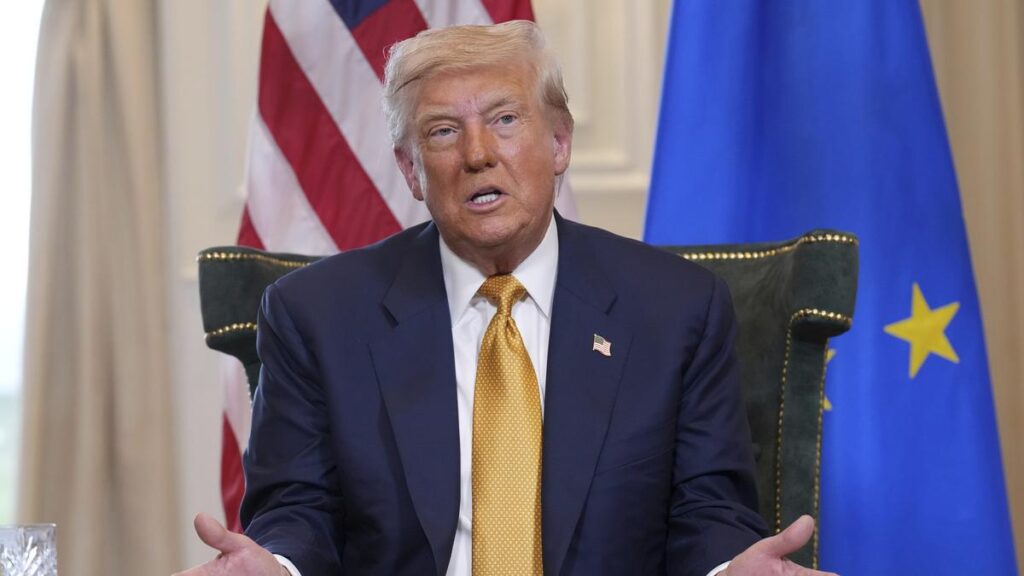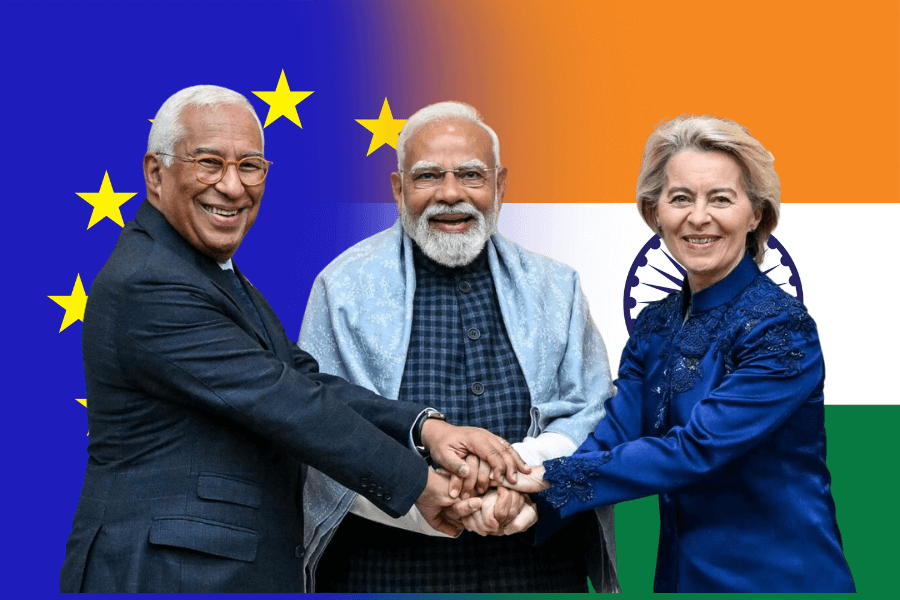
President Donald Trump gestures as he meets European Commission President Ursula von der Leyen at the Trump Turnberry golf course in Turnberry, Scotland Sunday, July 27, 2025. (AP Photo/Jacquelyn Martin)
US President Donald Trump has called on other nations to bolster their humanitarian aid to Gaza, highlighting the crisis as a global issue rather than solely a US responsibility. Speaking to reporters on Sunday prior to a meeting with European Commission President Ursula von der Leyen in Scotland, Trump stated that the United States would increase its aid, but emphasized the need for broader international participation. “It’s an international problem, it’s not a US problem,” he remarked.
The President noted the significant contributions the US is making, asserting that without American support, “people would have starved, frankly.” He also remarked that the next steps in Gaza would ultimately depend on Israel, especially in light of stalled negotiations with Hamas regarding ceasefires and hostage releases. “They don’t want to give them back, and so Israel is going to have to make a decision,” Trump said.
The ongoing conflict escalated following the October 7, 2023 attack by Hamas on Israel, which resulted in approximately 1,200 fatalities and over 250 hostages taken into Gaza. Since then, reports from the Hamas-controlled health authority indicate that nearly 60,000 individuals have died in Gaza, a figure that remains unverified but is considered credible by United Nations agencies.
Humanitarian Efforts Intensify Amid Crisis
In response to the dire humanitarian situation, large-scale aid deliveries have begun reaching Gaza for the first time in months. A convoy of about 100 lorries carrying essential supplies entered through the Kerem Shalom border crossing on Sunday. Earlier, the Israeli military announced a tactical pause in military operations from 10:00 to 20:00 local time to facilitate humanitarian efforts in designated areas, including al-Mawasi, Deir al-Balah, and Gaza City.
While Israel has labeled al-Mawasi a “humanitarian zone,” military operations have reportedly continued there, resulting in numerous casualties. The World Health Organization’s central warehouse, located in Deir al-Balah, was reportedly damaged during ground troop activities.
The Israeli military has also established humanitarian corridors to allow aid organizations to deliver food and medical supplies from 06:00 to 23:00 local time. UN emergency relief coordinator Tom Fletcher welcomed this initiative, stating, “We will do all we can to reach as many starving people as we can in this window.”
The World Food Programme (WFP) confirmed that its teams are prepared to distribute food at scale across Gaza. WFP Director Cindy McCain emphasized the urgency of the situation, urging immediate action. UNICEF echoed this sentiment, describing the situation as catastrophic for children, with many suffering from hunger and trauma.
International Reactions and Criticism
Israel’s decision to resume aid deliveries comes amid mounting international criticism of its military operations in Gaza. Since the cessation of a ceasefire in March, aid has been limited. Recently, the World Health Organization warned of an impending hunger crisis affecting the population.
While the Israeli government has rejected claims of a famine, suggesting instead that it is a “campaign” orchestrated by Hamas, criticism from within the Israeli government has surfaced. The far-right National Security Minister Itamar Ben-Gvir condemned the resumption of aid, labeling it a “slap in the face” to Israeli soldiers. He expressed concerns that such humanitarian aid could prolong the conflict.
As the humanitarian situation in Gaza remains critical, the need for international cooperation and sustained aid efforts is increasingly urgent. The consequences of the conflict continue to unfold, with the potential for further escalation if diplomatic solutions are not reached.







